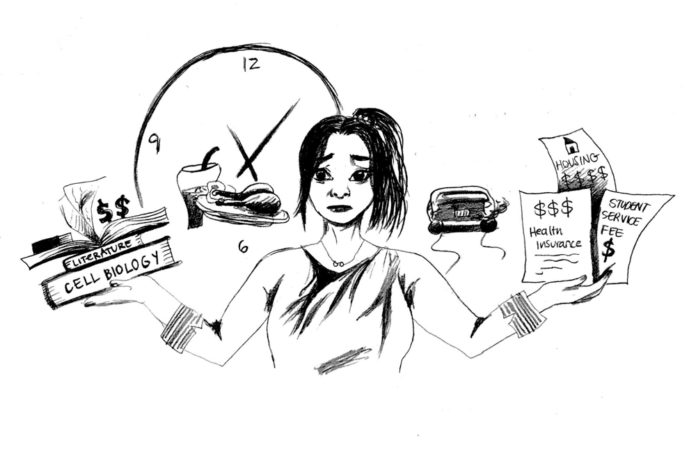It’s always the same gut feeling. First, there’s a sharp pang that starts near my sternum, followed by a sinking sensation trickling down into the pit of my stomach. A voice teases apart the carefully constructed wall I put up to my sunny LA friends. “You’re poor,” it mocks. It reminds me I’m in danger of being found out or judged, reminds me of the identity I tried desperately to shed when I came to Occidental.
It’s true. The first card I swiped as a semi-autonomous pre-teen was not a piece of plastic I was proud of. It wasn’t debit or credit, but an EBT card that I tucked in my pocket — confused about its meaning but accumulating significant shreds of societal shame anyway. My family did an incredible job of keeping my and my siblings’ best interests in mind and finding creative solutions to give us the childhood we had. I don’t take this for granted, and I know it’s a form of privilege, but it took me a while to acknowledge that the financial limitations I was raised with impacted my life in many ways.
Growing up poor — like below the poverty line poor — does something to your psyche. I’m not saying I’m permanently effed up or that I haven’t worked on healing, but that the conditioned responses I have to money differ from my more financially stable peers and friends. I also know, even at this affluent of an institution, I’m not alone.
Occidental, like many colleges and institutions of its kind, enjoys touting a diverse student body as a selling point. It’s even in our mission statement. In admissions information sessions, Occidental representatives proudly tell prospective families that 70 percent of students have some kind of financial aid. This attitude reflects the “level playing field” perspective the college attempts to instill: no matter your economic background, no matter how much assistance you do (or don’t) have, now that you’re sitting in the same room and eating the same food, it’s all the same. This attitude diminishes dialogue and erases potential resources for students coming from low-income backgrounds and communities.
Occidental is not a level playing field. Becoming independent and handling finances mean very different things for people of different economic backgrounds. At this school, the “level playing field” mentality permeates all of us, so when I’m reminded of financial stratification through speaking to my peers and noting my differences, I always feel that cold feeling of shock and shame. It arises when we discuss “low-income communities” in classrooms, have conversations about activities at our non-college homes or tentatively say yes to going out with friends when you don’t have the money.
If you grow up budgeting everything — not just money but time and energy — resource management feels different. I often feel stressed about time in ways my friends don’t, and it took me a long time to attribute that to the “poor kid mentality” I’ll never be able to fully shake. Financial aid creates a significant pressure to perform, and liberal arts colleges are frustratingly bad at discussing classism for fear of exposing their own paradoxical role in it: this wealthy, privileged institution expects us to invest tens of thousands of dollars a year for an education. Ideally, this amount of money would not be required to earn a college degree, but as long as it is, we should be talking about it. I’m getting tired of discussing economic inequality without considering the role that Occidental and institutions like it play.
I don’t consider my economic status to be the greatest indicator of my identity or a determinant of the kinds of relationships I can sustain, but I still often feel shocked when I find out a friend of mine comes from money. It feels like this palpable rift between us, a tenet of success that I can’t ever measure up to. Sometimes I interpret it, unfairly, as a personal attack on my self-esteem. Annoyingly, it seems every person I know at this college is more wealthy than I am. I interact with students from middle- to upper-class backgrounds more often than I interact with low-income students. This has sustained a feeling of isolation during my college years; the difference in financial experience feels like a fundamental difference in personality I can’t account for. It’s exhausting to constantly be aware of these differences in background and lived experience without the tools to tackle my shame and participate in dialogue with my well-intentioned yet well-off friends.
Economic status does not inherently determine whether or not you’re a good person. It does, however, cause you to develop different systems of knowing and interpreting situations. The differences are heightened in a college environment, where you have to know how to fund your education, purchase resources for yourself, navigate financial dialogue with peers and work through both internalized and interpersonal classism.
The gut sensation, the shame and guilt and panic I feel when my economic status has been “found out” — these are all things I will continue to work on both during and beyond college. But to my knowledge, Occidental has no resources or programs to support low-income students’ transition to college specifically. I would love to see more work from the college and campus community to call out classism and support this group of students by instituting purposeful resources and spaces for dialogue. Shame is reduced the more we’re able to have transparent dialogue about both differing background experiences and the paradox of being a poor kid at a rich school.
Stella Ramos is a sophomore religious studies major. She can be reached at sramos@oxy.edu
![]()




































